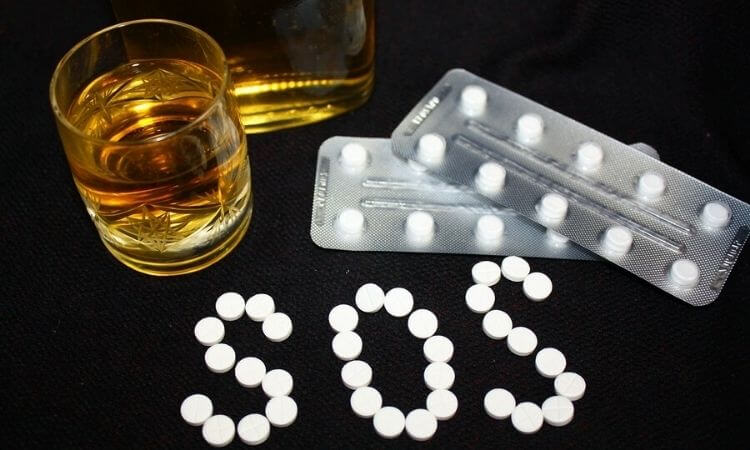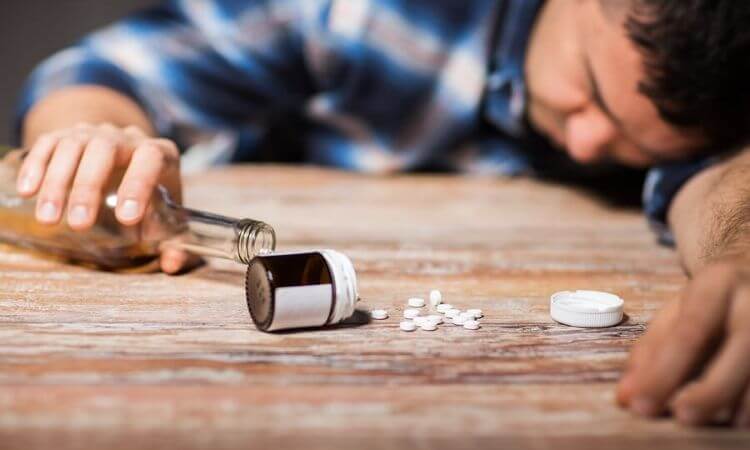
While Valium is considered to be relatively safe for most adult users when used as directed by a doctor, mixing Valium and alcohol or taking it with other drugs can result in severe side effects, including the following:
- Confusion
- Disorientation
- Dizziness
- Sedation
- Stumbling
- Accidents
- Nausea
- Loss of consciousness
- Addiction
- Brain damage
- Coma
- Death
What Is Valium?
Valium (diazepam) belongs to a class of drugs called benzodiazepines (benzos). Diazepam is commonly prescribed as a sedative/anxiolytic and anti-seizure agent, and to help people with anxiety or insomnia to help them relax or fall asleep. It is also sometimes used to treat muscle spasms, restless leg syndrome, and symptoms of alcohol withdrawal.
The benzo family also includes other popular anti-anxiety medications, such as alprazolam (Xanax), lorazepam (Ativan), and clonazepam (Klonopin). Benzodiazepines are scheduled substances because they do have the potential for abuse.
Misusing Valium or abusing it with other drugs or alcohol also increases the likelihood of developing chemical dependency and addiction. As noted, Valium is considered to be safe for most adult users when taken as prescribed by a doctor. However, abusing this medication by combining it with other medication, illegal drugs, or alcohol poses significant risks.
Some users combine Valium and alcohol or use it with other drugs to amplify their euphoric effects, but some take Valium in conjunction with other substances without knowing they are compromising their health and safety. To prevent excessive sedation, injury, or overdose, it is vitally important to be aware of the possible interactions of Valium and other intoxicating substances.

Effects on the Brain and Body
Valium acts on the central nervous system (CNS) to reduce activity by means of GABA receptors (gamma-aminobutyric acid), a naturally occurring agent made from glutamate in brain cells. GABA is the body’s primary inhibitory neurotransmitter and is responsible for inhibiting nerve impulses when we are placed in stressful situations.
Overall, Valium has a depressant effect that helps to prevent seizures and muscle spasms. It can also have a sedating effect on the user and make him or her feel drowsy.
Drug and Alcohol Contraindications
The dangers of Valium dramatically increase when it is used at the same time as other drugs or alcohol. In particular, the following substances, when combined with Valium, pose a heightened risk of overdose, loss of consciousness, coma, and death:
- Alcoholic drinks
- Barbiturates
- Cocaine
- Methamphetamine
- Opioid painkillers, such as hydrocodone, oxycodone, and hydromorphone
- Illicit opioid drugs, such as heroin and street fentanyl
- Other benzos or sedatives, such as Xanax
- Sleep medications, such as Ambien
Many of these substances are CNS depressants, meaning that they reduce activity in the brain and slow down various physiological processes. Combining these drugs with Valium can amplify the effects of both, making the user more vulnerable to the dangers of profound CNS depression.
The use of Valium in conjunction with stimulants like cocaine or meth can also threaten the user’s health and safety. Abusing multiple substances increases the risk of dangerous drug interactions, overdose, addiction, accidents, and death.
The abuse of Valium with alcohol, opioids, or other prescription medications is not always intended. Some people with legitimate prescriptions for Valium drink alcs drug, unaware of the potential hazards. The National Institute on Alcohol Abuse and Alcoholism (NIDA) warns that benzos like Valium can increase the sedating effects of alcohol, making the user even more drowsy, confused, disoriented, and susceptible to accidents or injuries.
Risk of Overdose
According to the Morbidity & Mortality Weekly Report (MMWR), benzos like Valium were involved in more than 408,000 emergency department visits in 2010. Among patients who overdosed on Valium, alcohol is often used in conjunction with this medication, intensifying its sedative effects. In fact, MMWR reported that more than 27% of ER visits related to benzos also involved alcohol and that over 26% of the those who died as a result of benzo use had also consumed alcohol.
Opioid medications such as Percocet, OxyContin, Dilaudid, and Vicodin are commonly prescribed in the United States to mitigate moderate-severe pain. The Western Journal of Emergency Medicine stated that in 2012, there were nearly 182 million prescriptions written for opioid medications.
Furthermore, it also claims that the growing accessibility of these drugs was partially responsible for the increase in ER visits involving other substances such as alcohol and benzodiazepines. The Journal added that a significant number of patients treated for an opioid overdose in an emergency department setting also tested positive for benzo use.
Like Valium, opioid painkillers can depress certain CNS activity but have a more potent effect on respiration and heart rate. When used alone, Valium is unlikely to result in severe respiratory depression or a dangerously slow heart rate. But, when taken with opioids, these substances can enhance CNS depression produced by Valium, making it more likely that the user will encounter one or more of the following symptoms:
- Slow breathing
- Slow heart rate
- Low blood pressure
- Cool, clammy skin
- Bluish lips or fingernails
- Drowsiness and fatigue
- Confusion
- Stumbling
- Loss of balance
- Dizziness
- Unconsciousness
- Coma
When a person’s heart rate becomes so depressed that blood and oxygen are no longer delivered to the brain and respiration becomes so labored that the body is no longer receiving oxygen, he or she is at risk of death. While some lethal overdoses are accidental, others are deliberate and planned. The Centers for Disease Control and Prevention (CDC) states that benzos such as Valium were among the leading drugs used in suicide deaths between 2005-2007 and that 31% of suicides involved prescription drugs and alcohol.
Addiction

The use of Valium and alcohol or with other drugs places the user at a higher risk of chemical dependency and addiction. Valium and other depressant substances can have a symbiotic effect, heightening the user’s response to the drugs. Users who have experienced the amplified effects of multiple substances may no longer be content with using a single substance, especially when a variety of drugs and alcohol are easily accessible.
The Substance Abuse and Mental Health Services Administration (SAMHSA) points out that people who already have substance abuse disorder, such as opioid addiction or alcoholism, are more likely to abuse benzos than the general population. Indeed, a large percentage of patients in addiction treatment programs abuse benzos in conjunction with other drugs or alcohol.
Also, people suffering from alcohol addiction sometimes use Valium to avoid the potentially dangerous symptoms of alcohol withdrawal, such as tremors and seizures. Valium is prescribed in some detox programs to help counteract some of the more severe effects of alcohol withdrawal syndrome.
Regardless, it is unsafe and illegal to take diazepam a manner not in accordance with a doctor’s orders. Moreover, the only safe, effective way to withdraw from alcohol, benzos, opioids, or other drugs is through a professional detox program that provides intensive clinical supervision.
Treatment for Valium and Alcohol Addictions
Individuals who abuse Valium and alcohol, or take it with other drugs, have what is called a polysubstance use disorder. This condition can be more dangerous than an addiction to any one substance alone.
Midwood Addiction Treatment offers an integrated approach to addiction that includes therapeutic services essential to the process of recovery, such as psychotherapy, counseling, group support, and more.
If you or someone you love is struggling with an addiction Valium, alcohol, or a combination of substances, contact us today. Discover how we help people free themselves from the jaws of addiction and learn how to lead healthier, more satisfying lives!